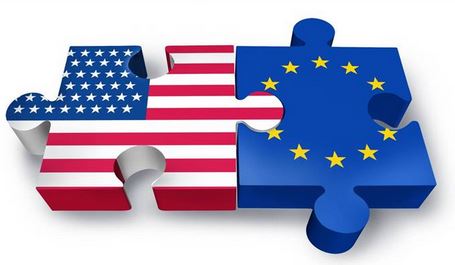The Transatlantic Trade and Investment Partnership (TTIP) is a free-trade deal intending to boost the economies of the EU and the US by removing or reducing barriers to trade and foreign investment.
According to President Barack Obama said, the TTIP would promote “new growth and jobs on both sides of the Atlantic”, he said when the talks were launched. Critics reject that claim.
A study by the Centre for Economic Policy Research (CEPR) – done for the European Commission – estimated the potential gains for the EU as up to €119 billion ($134 billion) a year and €95 billion ($107 billion) for the US. However, it means that for a family of four that comes to €545 per year in the EU and €655 in the US. Wages would be higher, by 0.5% in the EU and just under 0.4% in the US.
How would TTIP work?
By eliminating almost all tariffs (taxes applied only to imported goods) on trade between the US and the EU.
However, the tariffs imposed by the US and EU are already relatively low for the most part, although there are some exceptions in (e.g. farm produce and textiles).
The bigger gains envisaged would come from reducing what are called non-tariff barriers. In particular the two sides think they can promote trade through what they call regulatory co-operation.
The European Commission says that rules in EU and the US often achieve the same level of consumer safety and product quality, but differ in their technical details and their methods for ensuring that firms have met the rules.
One of the aims of TTIP is to reduce this burden on business. One option is recognizing one another’s standards. That’s under consideration for many types of goods. They also plan to co-operate more closely on new regulation.
That basic idea is that by reducing the cost of exporting, TTIP would encourage more of it.
However, the European Commission says an agreement in the foreign investment area would prohibit discrimination against foreign investors, expropriation, denying access to the courts and arbitrary and abusive treatment.
If a foreign investor felt these rules had been violated, they would have access to a system known as investor state dispute settlement (ISDS). This is a system of tribunals that could award compensation to the investor if they had lost money as a result of a breach of the rules in the agreement.
TTIP controversy:
Regulation
Much of the concern is about the regulatory aspect: that it would lead to lower standards of consumer and environmental protection and safety at work. A group of 170 European civil society organizations said in a statement that regulatory co-operation as envisaged in TTIP would result in “downward harmonization”.
There is also a concern that TTIP could undermine governments’ right to regulate in the public interest. They say it will also give business groups a disproportionate influence over new regulation, and therefore, they argue, it is undemocratic.
Investment
There are also questions about whether a TTIP agreement would really stimulate more investment.
ISDS has generated a lot of heated opposition. One complaint is that it will discourage governments from regulating in the public interest.
ISDS arrangements are common in international investment agreements.
However, a research by the UN Commission on Trade and Development suggests investors have made more use of the tribunal system in recent years.
TTIP timetable
A summit of European leaders in December called for a comprehensive agreement by the end of 2015, though the European Trade Commissioner Cecilia Malmström has said that is probably unrealistic.
TTIP would then have to be approved by the European Parliament and European Trade Ministers. The Ministers usually vote on trade by what is called qualified majority though unanimity might be required – that is both a legal question and a matter of political judgement.
Depending on the legal nature of the final agreement it might also need to be approved by all the EU member states, and Commissioner Cecilia Malmström has said that is likely to be necessary.
TTIP will need approval by the US Congress. President Barack Obama is struggling unsuccessfully so far – to get Congress to give him what is called Trade Promotion Authority which would make US ratification less difficult.
In the same time there is a global trade negotiation under way in the World Trade Organization (WTO). It is known as the Doha Round, because that is where it was launched – back in 2001.
Other big trade deal is the Trans Pacific Partnership (TPP), which involves 11 countries, including the US and Japan (but not China). TPP is also still under negotiation.
